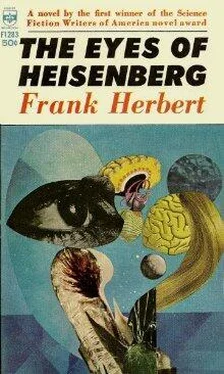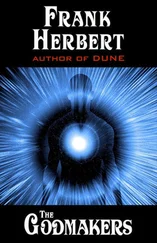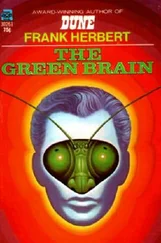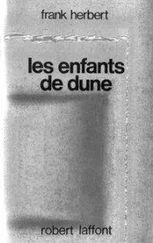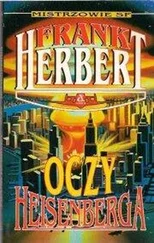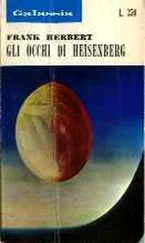Svengaard shook his head.
“No,” Potter said.
“There’s a strong possibility it isn’t significant,” the man on the phone said. “In a system of increasing determinism -”
“Oh, yes,” Potter sneered. “In a system of increasing determinism you get more and more indeterminism. You might as well say in a foofram of increasing haggersmaggle -”
“Well, it’s what they believe.”
“So they say. I believe Nature doesn’t like being meddled with.”
Potter stared into the screen. For some reason, he recalled his youth, the beginning of his medical studies and the day he’d learned how very close his genotype had been to the Optiman. He found that the old core of hatred had become mildly amused tolerance and cynicism.
“I don’t see why they put up with you,” the man on the phone said.
“Because I was very close,” Potter whispered. He wondered then how close the Durant embryo would be. I’ll do my best, he thought.
The man on the phone cleared his throat, said, “Yes, well I’ll depend on you to handle things at your end. The embryo ought to provide some verification of the outside inter -”
“Don’t be a total ass!” Potter snapped. “The emb will bear out Sven’s report to the last enzyme. You tend to your job; we’ll do ours.” He slapped the cut-off, pushed the phone back onto the desk and sat staring at it. “Pompous damned… no—he’s what he is because he’s what he is. Comes from living too close to them. Comes from the original cut. Maybe I’d be an ass too if that’s what I had to be.”
Svengaard tried to swallow in a dry throat. He’d never before heard such an argument or such frank talk from the men who operated out of Central.
“Shocked you, eh, Sven?” Potter asked. He dropped his feet to the floor.
Svengaard shrugged. He felt ill-at-ease.
Potter studied the man. Svengaard was good within his limits, but he lacked creative imagination. A brilliant surgeon, but without that special quality he was often a dull tool.
“You’re a good man, Sven,” Potter said. “Dependable. That’s what your record says, you know. Dependable. You’ll never be anything else. Weren’t meant to be. In your particular niche, though, you’re it.”
Svengaard heard only the praise, said, “It’s good to be appreciated, of course, but -”
“But we have work to do.”
“It will be difficult,” Svengaard said. “Now.”
“Do you think that outside adjustment was an accidental thing?” Potter asked.
“I—I’d like to believe that"—Svengaard wet his lips with his tongue—"it wasn’t determined, that no agency…”
“You’d like to lay it to uncertainty, to Heisenberg,” Potter said. “The principle of uncertainty, some result of our own meddling—everything an accident in the capricious universe.”
Svengaard felt stung by a quality of harshness in Potter’s voice, said, “Not precisely. I meant only that I hoped no super causal agency had a hand in -”
“God? You don’t really mean you’re afraid this is the action of a deity?”
Svengaard looked away. “I remember in school,” he said. “You were lecturing. You said we always have to be ready to face the fact that the reality we see will be shockingly different from anything our theories led us to suspect.”
“Did I say that? Did I really say that?”
“You did.”
“Something’s out there, eh? Something beyond our instruments. It’s never heard of Heisenberg. It isn’t uncertain at all. It moves.” His voice lowered. “It moves directly. It adjusts things.” He cocked his head to one side. “Ah-hah! The ghost of Heisenberg is confounded!”
Svengaard glared at Potter. The man was mocking him. He spoke stiffly, “Heisenberg did point out that we have our limits.”
“You’re right,” Potter said. “There’s a caprice in our universe. He taught us that. There’s always something we can’t interpret or understand… or measure. He set us up for this present dilemma, eh?” Potter glanced at his finger watch, back to Svengaard. “We tend to interpret everything around us by screening it through that system which is native to us. Our civilization sees indeterminately through the eyes of Heisenberg. If he taught us truly, how can we tell whether the unknown’s an accident or the deliberate intent of God? What’s the use of even asking?”
Svengaard spoke defensively, “We appear to manage, somehow.”
Potter startled him by laughing, head tipped back, body shaking with enjoyment. The laughter subsided and presently Potter said, “Sven, you are a gem. I mean that. If it weren’t for the ones like you, we’d still be back in the muck and mire, running from glaciers and sabretooth tigers.”
Svengaard fought to keep anger from his voice, said, “What do they think this arginine adjustment is?”
Potter stared at him, measuring, then, “Damned if I haven’t underestimated you, Sven. Apologies, eh?”
Svengaard shrugged. Potter was acting oddly today—astonishing reactions, strange eruptions of emotion. “Do you know what they say about this?” he asked.
“You heard Max on the phone,” Potter said.
So that was Allgood, Svengaard thought.
“Certainly, I know,” Potter growled. “Max has it all wrong. They say gene-shaping inflicts itself on nature—on a nature that can never be reduced to mechanical systems and, therefore, to stationary matter. You can’t stop the movement, see? It’s an extended system phenomenon, energy seeking a level that’s -”
“Extended system?” Svengaard asked.
Potter looked up at the man’s scowling face. The question focused Potter’s attention abruptly on the differences in thought patterns between those who lived close to Central and those who touched the Optiman world only through reports and second-hand associations.
We are so different, Potter thought. Just as the Optimen are different from us and Sven here is different from the Sterries and breeders. We’re cut off from each other… and none of us has a past. Only the Optimen have a past. But each has an individual past… selfishly personal… and ancient.
“Extended system,” Potter said. “From the microcosmos to the macrocosmos, they say all is order and systems. The idea of matter is insubstantial. All is collisions of energy—some appearing large, swift and spectacular… some small, gentle and slow. But this too is relative. The aspects of energy are infinite. Everything depends on the viewpoint of the observer. For each change of viewpoint, the energy rules change. There exist an infinite number of energy rules, each set dependent on the twin aspects of viewpoint and background. In an extended system, this thing from outside assumes the aspect of a node appearing on a standing wave. That’s what they say.”
Svengaard slipped off the desk, stood in a rapture of awe. He felt that he’d had a fleeting glimpse, a wisp of understanding that penetrated every question he might ask about the universe.
Could that be what its like to work out of Central? he wondered.
“That’s a great summation, isn’t it?” Potter demanded. He stood up. “A truly great idea!” A chuckle shook him. “You know, a guy named Diderot had that idea. It was around 1750 or thereabout. They spoon-feed it to us now. Great wisdom!”
“Maybe Diderot was… one of them,” Svengaard ventured.
Potter sighed, thinking, How ignorant a man can become on a diet of managed history. He wondered then how his own diet had been adjusted and managed.
“Diderot was one of us,” Potter growled.
Читать дальше
